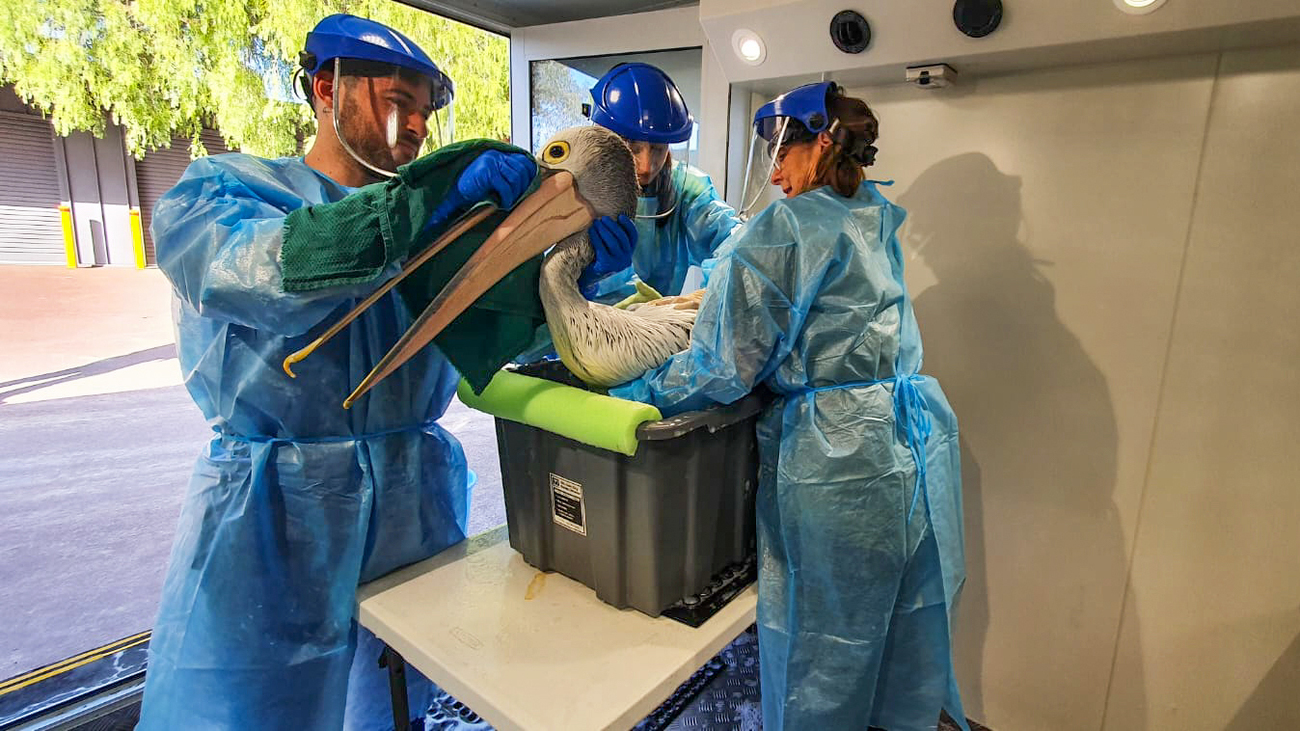Wildlife Rescue - Australia
Australia has one of the highest mammal extinction rates in the worldOil spill remains a mystery as pelican clean-up continues
Oil spill remains a mystery as pelican clean-up continues

Pressure is on Western Australian authorities to identify the cause of an oil spill impacting seabirds as the first rehabilitated pelicans are on track to be released.
More than 45 pelicans have been rescued by Western Australia Seabird Rescue and admitted to the WA Wildlife Hospital since late May when oiled pelicans were first sighted south of Perth.
International Fund for Animal Welfare (IFAW) deployed to help our partner WA Wildlife Hospital treat and manage the influx of pelicans. The WA Wildlife Hospital is at capacity with 33 pelicans in care and more likely to be rescued in the coming weeks.
“Seabirds already face so many human-made risks such as plastic waste, fishing lines, and hooks, and now on top of that, they’re having to deal with oil in their habitat. They often don’t know the mess they’re getting into, but it can have devastating impacts,” IFAW Animal Rescue Officer Robert Leach said.
“It takes a village to respond to an incident like this. It’s our hope that together we can release as many pelicans as possible back into the wild but until the source of the spill is identified, it continues to pose a risk to the birds.
“As some are nearing their full recovery and ready to be released, we don’t want them to have to remain in care for any longer than necessary. It’s urgent that authorities find the source of the spill that has put so many birds at risk.”
Because of the quick action taken by rescue teams, 10 out of the 33 pelicans under the expert care of the IFAW-supported team are on track to be released. However, with the cause of the spill still unknown, there are concerns about safely releasing the rehabilitated pelicans without putting them back in harm’s way.
"The WA Wildlife Hospital's ability to cope with the immense challenge of caring for the oiled pelicans was significantly bolstered by the crucial support provided by IFAW. In the face of this crisis, IFAW's unwavering commitment and generous assistance played a pivotal role in ensuring the hospital had the necessary resources, expertise, and financial support to effectively manage the situation,” WA Wildlife Director of Operations Dean Huxley said.
”This partnership enabled the hospital's dedicated team of staff and volunteers to provide the highest level of care and rehabilitation for these affected pelicans. Together, IFAW and the WA Wildlife Hospital demonstrated the power of collaboration and showcased the profound impact that can be achieved when organisations unite in their mission to protect and preserve our precious wildlife."
The biggest risk the pelicans face is becoming waterlogged which can be detrimental to their health. Oil toxins can destroy the natural waterproofing in a pelican’s feathers and cause the bird to succumb to hypothermia.
The task of capturing and cleaning the birds is laborious as it can take weeks to restore their natural waterproofing before they can be released.
The first sighting of oiled pelicans was reported on May 28 with authorities still investigating the cause of the spill.
ENDS
Press Contact
IFAW Australia
Dominica Mack
m: 0460 432 901
e: dmack@ifaw.org
Notes:
· Five pelicans have sadly died or required humane euthanasia due to their poor condition and other injuries. Eight pelicans have been transferred to Darling Range Wildlife Shelter to free up space at the WA Wildlife Hospital.
· Volunteers from Western Australia Seabird Rescue assisted the WA Wildlife Hospital in the washing of oiled pelicans.
About IFAW (International Fund for Animal Welfare) - IFAW is a global non-profit helping animal and people thrive together. We are experts and everyday people, working across seas, oceans and in more than 40 countries around the world. We rescue, rehabilitate and release animals, and we restore and protect their natural habitats. The problems we’re up against are urgent and complicated. To solve them, we match fresh thinking with bold action. We partner with local communities, governments, non-governmental organisations and businesses. Together, we pioneer new and innovative ways to help all species flourish. See how at ifaw.org
Related content
Our work can’t get done without you. Please give what you can to help animals thrive.